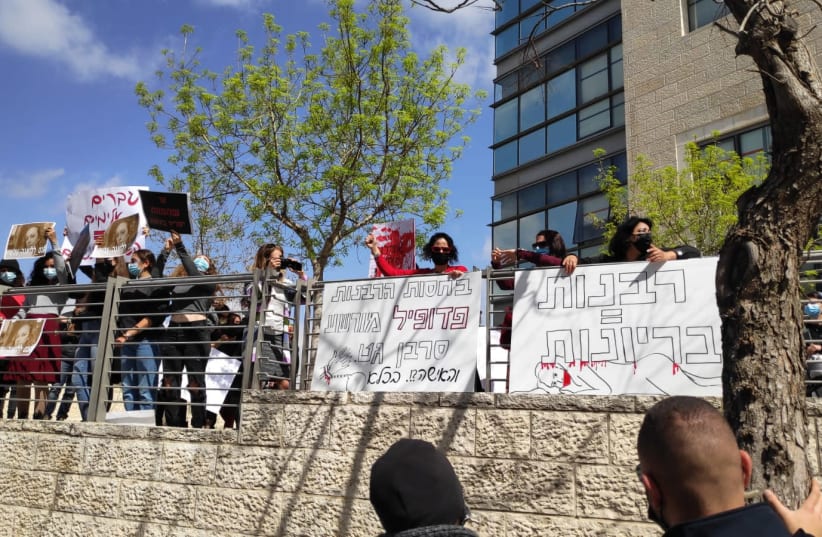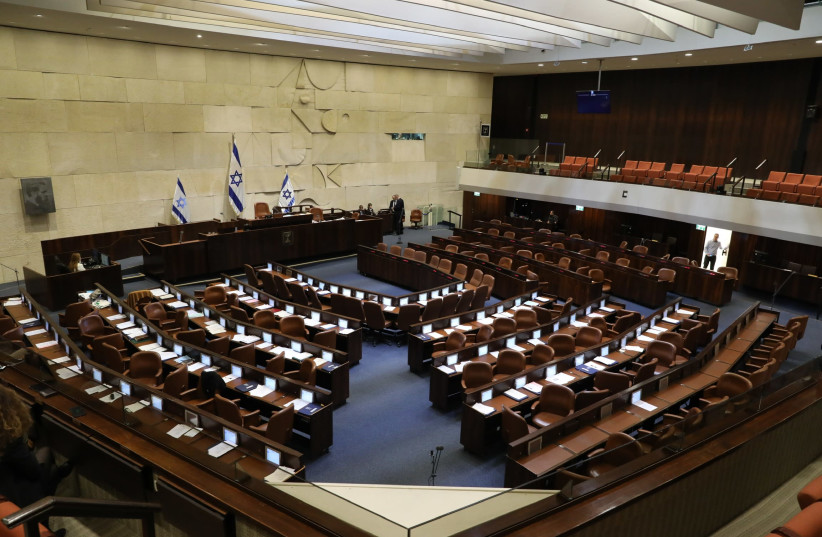A new umbrella group of women’s organizations has been launched in Israel to respond to the lack of female representation in Prime Minister Benjamin Netanyahu’s recently installed government.
The Coalition for Women’s Organizations and Equality comprises more than 50 women’s groups.
Out of the 32 ministers in Netanyahu’s cabinet, only six are women. And two of the parties in his coalition – the ultra-Orthodox United Torah Judaism and Shas – refuse, on principle, to include women on their slates of candidates for the Knesset, Israel’s parliament, let alone to be represented by a female cabinet minister.
By contrast, a third of the ministers in the previous government were women.
Members of the newly formed women’s coalition visited the Knesset on Tuesday to make their case. The parliament was hosting its first meeting for the Committee on the Status of Women and Gender Equality.
“The formation of the current government acted as a catalyst for the founding of the women’s coalition.”
Moran Zer Katzenstein
“The formation of the current government acted as a catalyst for the founding of the women’s coalition,” Moran Zer Katzenstein, founder of the Bonot Alternativa women’s organization and the Women’s Coalition, told The Media Line.
She points out that “only 0.9% of philanthropic giving worldwide goes to [organizations] advancing women. This is insane,” she says. “Where there is money, there is power, and these organizations don’t have much money which is also something to think about.”
“We are made up of over 50 organizations and new ones are joining us all the time,” she said. “We understood that now is the time for us to join hands and collaborate, because if the government enacts even just half of the steps it has planned, then the situation for women in the State of Israel will be very bad.”
Zer Katzenstein says she is “worried about the extremism, about the planned discrimination and the lack of female representation in the government.”
What will the women's coalition do for the women of Israel?
Members of the women’s coalition hope that joining forces will help to advance the status of women and fight back against any discriminatory legislation. Based on the public positions, campaign promises, and coalition agreements of the various parties in Netanyahu’s new government, observers anticipate that a slew of discriminatory legislation and policies could be in the offing. These include measures that would permit gender segregation in public spaces, bar female soldiers from certain Israeli military units, and allow private businesses to refuse service to women or prevent them from entering during certain hours, on religious grounds.
“This is the moment of truth for the citizens of Israel, and mostly women. We have to join forces to work together,” Gali Etzion, head of the Legislation and Counseling Department for Na’amat, Israel’s largest women’s organization, told The Media Line. “They might take back the status of women in Israel related to family law, domestic violence, related to many things and we’re not going to let it happen,” she said.
Orit Lahav is a lawyer and the CEO of the Mavoi Satum (Hebrew for “Dead End”) organization, which advocates on behalf of women trapped in unwanted marriages because their husbands have refused to grant them divorce in the rabbinical courts.
“These are women who cannot get divorced according to the law in Israel. The husband must give the ‘get’ – a Jewish divorce document – in order for the woman to be freed from the marriage,” Lahav told The Media Line. “This is a serious violation of women’s rights here in Israel and has been going on for the past 75 years.”
Lahav explains that these women remain legally married against their will, kept in a kind of relationship “prison” by the state, the rabbinate, and their husbands. As long as a woman’s husband refuses to grant her a divorce, she cannot remarry. And moving on with her life by having children with a new partner, while officially remaining married to the husband who has refused her request for divorce, carries a tremendous social and religious stigma that can be passed on for generations.
“Women’s rights in this country must be protected, regardless of whether they are on the left or right [of the political spectrum],” she says. “The feminist struggle only began about 100 years ago and we still have a long way to go. Women are still not safe here, public spaces are not yet safe, there is violence against women, and some can’t get divorced. These are all problems that are happening here and if the government doesn’t address them then we’ll be in an even worse situation than we are today.”
Lahav says the divorce issue that her organization deals with cuts across the religious and political spectrums within the Jewish community. “We see women who are secular, religious, come from the left wing and right wing. It affects them all,” she says.
Likewise, the women’s coalition represents Israeli women from all ethnic and religious backgrounds and of all political stripes.
“The coalition has organizations dealing with everything related to women, whether it’s with ultra-Orthodox Jewish women or Arab women, whether the right to divorce or violence against women or pay equality,” says Lahav.
“The Coalition for Women’s Organizations and Equality has consolidated the fundamental common values among all the groups,” she says. “We are going to combat discrimination, violence against women, and also for the equal representation of women.”
There are currently only 29 female lawmakers in the 120-seat parliament, and “even those women who are a part of it don’t really act to advance women’s rights,” says Lahav.
Dr. Mazal Shaul, executive director of WePower, a nonprofit, nonpartisan NGO that helps women reach top positions in government, politics, and business, told The Media Line, “It’s really concerning to us that after 22 years of very hard work, in which we significantly helped to increase female representation, that we now suddenly have a government with almost no women in it.”
The women’s coalition aims to push for new laws that would change this by requiring that each party set aside some minimum quota of seats reserved for female lawmakers.
“We believe that there should be women in all the parties,” says Etzion. “Today there are two major parties [United Torah Judaism and Shas] in the coalition that do not allow women to even be part of them.”
Quota systems are used in countries such as India, Pakistan, Bangladesh, Mexico, Argentina, and Brazil, where political parties are required to ensure that a certain percentage of their candidates are women.
One of the first countries to implement a quota for women in politics was Sweden, which in 1971 implemented a “zipper system” for its national elections, under which political parties alternate men and women on their candidate lists, ensuring that men and women are equally represented. The zipper system has been adopted by the Labor party in Israel, as well as many prominent political parties in Europe, such as the Swedish Social Democratic Party, the Labour party in the Netherlands, the Social Democratic Party of Germany, and the Federation of the Greens in Italy.
Quotas for women in politics have been implemented, sometimes nationally, and sometimes voluntarily by individual parties, in several additional countries, including Spain, Belgium, France, Norway, and others.
Quotas have been found to be effective in increasing the representation of women in politics. Research suggests that quotas can lead to more women being elected to office and can also lead to changes in the types of issues that are prioritized by legislators. However, some argue that quotas can lead to the selection of less-qualified women and that they can reinforce stereotypes.
“Legislation needs to be enacted so that every party will have at least some kind of female representation,” says Lahav. “It’s not acceptable that we have ultra-Orthodox Jewish parties that don’t have a single woman. There is no one to represent ultra-Orthodox women. No one.”
She says that male ultra-Orthodox Knesset members claim to represent the interests of ultra-Orthodox women, but “they don’t actually attend the discussions that pertain to haredi [ultra-Orthodox] women, or address anything relating to women’s education, pay or health. There needs to be a woman in these parties in order to take on these issues.”
Netanyahu’s new government, the most right-wing in Israel’s history, appears to have lit a fuse among some. Thousands recently gathered in front of the parliament in Jerusalem to protest its swearing-in. Thousands more marched on Saturday night in Tel Aviv to protest the government’s planned overhaul of the judicial system. Additional protests are sure to be held, and the women’s coalition is likely to be a visible component of these.
Says Zer Katzenstein, “I think it’s important for people to know that there is a coalition of women working together in an organized way to defend women. I want women to know that they have a voice and they have strength. It’s possible that in the near future, we’ll call on them to join us for a collective struggle.”
It's not only Jewish Israelis who are concerned about how the new government will affect the status of women in Israel. Sali, a member of the Druze community, told The Media Line, “The fact that our government is passing legislation that permits citizens to discriminate against others is not legitimate. We deserve respect in any place we wish to go. This is one of our basic rights as citizens and human beings.”

